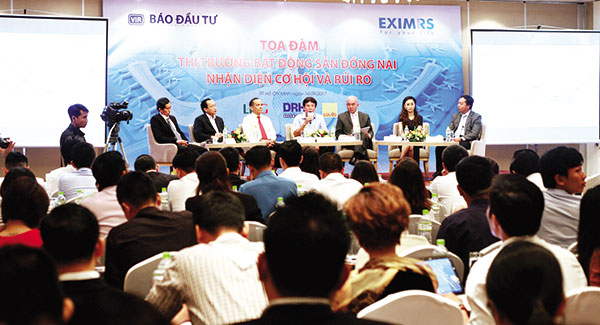
As the real estate sector in Dong Nai province booms with investment opportunities, investors should be cognisant of potential scams and con artists.
As the real estate sector in Dong Nai province booms with investment opportunities, investors should be cognisant of potential scams and con artists.
 |
| As the property market in Dong Nai is once again on the rise, experts urge caution Photo: Le Toan |
New wave of opportunities
Dong Nai, which covers an area of 5,900 square kilometres, is located right next to bustling Ho Chi Minh City. The province is well-connected with a network of national highways, ports, railways, and the upcoming Long Thanh International Airport. Thanks to its geographical advantages, Dong Nai has historically been a hotspot for foreign investments, which include real estate projects.
Reports from Savills Vietnam show that Dong Nai currently has 55 residential housing projects, with a total of 30,200 units and land plots for sale on both the primary and secondary market. Mega projects in Long Thanh and Nhon Trach wards, with a combined 2,100 land plot units, take up 46 per cent of the future supply in the province.
According to Su Ngoc Khuong, director of investment at Savills Vietnam, Dong Nai is now ready to return to the big picture. Residents and newcomers to Ho Chi Minh City are looking to move out of the congested city centre, and the neighbouring province has proven to be a great destination with its traffic connectivity and thriving urban areas.
This topic was discussed in depth last week at a talk named “Real estate Investment in Dong Nai: Opportunities and Challenges”, co-organised by VIR and Eximrs. At the event, industry experts shared their advice on how investors can capitalise on the new boom in Dong Nai properties.
Nguyen Thanh Lam, deputy director of the Dong Nai Department of Construction, advised investors to prioritise projects that are located near existing urban areas, including the city of Bien Hoa and nearby wards (Long Thanh, Long Khanh, and Trang Bom). Those with a longer investment horizon (between five and seven years) can branch out to the fringe areas of these urban clusters.
“It’s very important to think carefully before investing in projects near Long Thanh International Airport. About 21,000 hectares of land surrounding the airport have not been earmarked for development yet, and a bubble can burst very easily,” Lam warned.
Le Hoang Chau, chairman of the Ho Chi Minh City Real Estate Association, has said that he considers Dong Nai the “extended arm” of Vietnam’s largest city. He advised property investors to monitor development updates on the Dau Giay Highway, which extends to the central province of Binh Thuan, and Cat Lai Bridge, which links District 2 with Dong Nai’s Nhon Trach ward and the Ho Chi Minh City metro lines.
Remaining vigilant
Despite their optimism about the new chapter of Dong Nai properties, experts still voiced their concerns about reckless speculation. In fact, the province is not new to such horror stories, as properties in its Nhon Trach ward already went through a boom-and-bust cycle 10 years ago.
Specifically, investors and developers at the time flocked into the ward, hoping that it would soon become a first- or second-tier city, complete with urban facilities. However, the plan fell through and to this day, Nhon Trach remains an agricultural ward, filled with a haunting slew of abandoned properties. Experts say it is important to not repeat the same mistakes this time.
“Dishonest real estate agents have used lots of scamming methods to trick investors. They may blow up the price, overstate the amount of existing facilities, or even change the name of the project developers,” said lawyer Lam Dang Phuc, deputy managing director of Nguyen Giap Law Firm.
Lam from the Dong Nai Department of Construction revealed that he recently received a complaint letter from 300 individuals, claiming that they had been conned in two real estate projects in the province. The investigation process is now underway, and Lam reminded all investors to have a thorough check on the projects’ legal status before signing any deals.
This advice is echoed by Tran Thi Cam Tu, CEO of Eximrs. Tu recommended investors to slow down, think rationally, and double-check all the claims made by real estate agents.
Experts also emphasised the importance of urban facilities such as schools, hospitals, supermarkets, and parks in drawing in investors.
Nguyen Minh Khang, acting managing director of LDG Group, said that the company had developed these facilities in Trang Bom ward before putting any real estate on sale.
“Not only Dong Nai, but the entire real estate market in Vietnam needs honest and transparent dealers. There should be real people wishing to live in the province, not just reckless speculators,” Khang said.
(Source:VIR)



![[Photo series] Long Khanh Ring Road 1 ramps up construction for technical traffic opening on Feb. 3](/file/e7837c02876411cd0187645a2551379f/012026/anh_2_resized_20260119144842_20260119151818.jpg?width=500&height=-&type=resize)